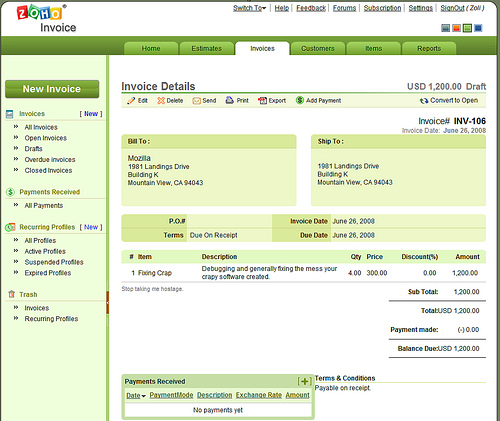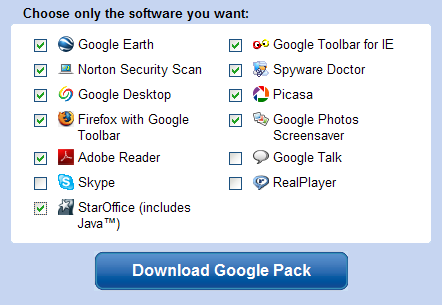 Several of my favorite Firefox extensions did not make it to 3.0 for compatibility reasons, but I found functional equivalents for almost all. Amongst the (temporary) losses is Zoho QuickRead, being replaced by OpenITOnline (The Zoho Team tells me QuickRead will be FF3 compatible in a few days The FF3 compatible Zoho QuickRead update is now available).
Several of my favorite Firefox extensions did not make it to 3.0 for compatibility reasons, but I found functional equivalents for almost all. Amongst the (temporary) losses is Zoho QuickRead, being replaced by OpenITOnline (The Zoho Team tells me QuickRead will be FF3 compatible in a few days The FF3 compatible Zoho QuickRead update is now available).
OpenITOnline is a handy extension that allows you to read documents online without the need to first download, then open them in the relevant Office applications. The file formats currently handled are:
- Documents (*.doc, *.rtf, *.odt, *.sxw)
- Spreadsheets (*.xls, *.csv, *.ods, *.sxc)
- Presentations (*.ppt, *.pps, *.odp, *.sxi)
- Images (*.jpg, *.gif,*.png)
There’s an easy guided setup, where I changed the default Zoho Viewer to the relevant “active” services, i.e. Zoho Writer, Sheet and Show. OpenITOnline also supports Google Docs and ThinkFree.
My old-style del.icio.us extension was replaced by the functionally richer new one. The PayPal Plugin became a casualty, just days after I had discovered it.
 The upgrade itself was anything but smooth sailing, and I’m not referring to the initial download fiasco. The new Firefox appeared to work fine on the Vista PC, but exhibited strange behavior on two XP machines.
The upgrade itself was anything but smooth sailing, and I’m not referring to the initial download fiasco. The new Firefox appeared to work fine on the Vista PC, but exhibited strange behavior on two XP machines.
It simply did not “remember” the settings for two key extensions: every single time I started Firefox I got flooded by pop-up windows to configure Gmail Manager (one window for each account) and had to go through the hoops of setting up Foxmarks. For a while I thought the extensions were to blame, or perhaps a strange interaction with some of the new extensions – once you’re on the wrong track, you can spend hours uninstalling/ reinstalling them in various sequences. But then I noticed some of my default settings were gone, homepage reset, cookie handling and history tracking all changed. Weirdest of all was the fact that the “OK” button did not work on any configuration/setup screen.
So now I knew something was wrong with Firefox itself – to cut a long story short, I could fix one of the laptops by some magic sequence of uninstalling/reinstalling everything a few times, but the other one was hopeless. I had to resort to brute force: uninstall Firefox, wipe out all related directories (those ugly documents etc.. \user\ local data\whatever paths), then System Restore to the day before the Firefox upgrade, then install everything again, followed buy repeated Windows and McAfee updates that the system forgot due to the Restore. It was ugly.
Now Firefox 3 (almost) works, except that the “Use my choice for all cookies from this site” button does not seem to do anything. (Update: It’s damn frustrating having to hit the same button a zillion times!)
I lost about half a day, and more importantly at a time I really couldn’t afford it, had more urgent things to do. Not the first time, and I’m afraid not the last one either. But this time I’ve decided to do something about it: I’m presenting a virtual invoice to Mozilla, for the productive time lost.
Of course this invoice won’t ever be paid.. but I already feel better. Every time a software company hijacks my productive time, I will create a Virtual Invoice. (I already have another one in the queue, for Microsoft… coming soon).


 This is a speculative post. As it is widely known,
This is a speculative post. As it is widely known,  )
)




 When it didn’t happen, they must have lost interest – the annual Money upgrades brought less and less new features or even bug fixes, and smart users started to skip releases between upgrades. Then trouble started left and right: weird things happened to my accounts beyond my control. Categorization? I’ve long given up on it, most of my downloaded data is associated with junk categories. The real bad part: data changed in existing accounts, very old transactions downloaded again into already reconciled months..etc. This is my bank account, my money we’re talking about! The very data I meticulously took care of while in my possession now got randomly changed. The only way to be really sure I have the right balances was (is) to go and verify them at the individual bank or broker sites.
When it didn’t happen, they must have lost interest – the annual Money upgrades brought less and less new features or even bug fixes, and smart users started to skip releases between upgrades. Then trouble started left and right: weird things happened to my accounts beyond my control. Categorization? I’ve long given up on it, most of my downloaded data is associated with junk categories. The real bad part: data changed in existing accounts, very old transactions downloaded again into already reconciled months..etc. This is my bank account, my money we’re talking about! The very data I meticulously took care of while in my possession now got randomly changed. The only way to be really sure I have the right balances was (is) to go and verify them at the individual bank or broker sites. ) and not even feel the need to apologize. It’s the absolute Cardinal Sin. And now this company wants me to put my trust in their services?
) and not even feel the need to apologize. It’s the absolute Cardinal Sin. And now this company wants me to put my trust in their services?

![Reblog this post [with Zemanta]](https://www.zoliblog.com/wp-content/uploads/HLIC/c3f6a73b6f73860cb3967d8190b33e5c.png)
 24SevenOffice
24SevenOffice

Recent Comments